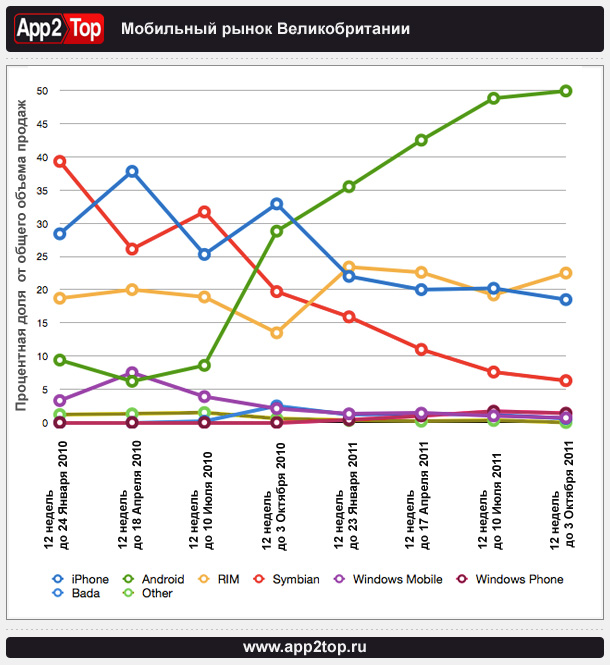How Android will be able to get 70% of the market in 2012
 In 18 months, Google has managed to increase its market share in the UK by about 40% (which totaled about 50%).
In 18 months, Google has managed to increase its market share in the UK by about 40% (which totaled about 50%).
It was possible to do this mainly due to Nokia and Symbian, as well as due to Apple, whose share was fixed at about 20%. RIM is also more or less stable, but its future is not enviable, unless the company takes steps to improve competitiveness.
The level of 50% Android has been achieved not only in the UK, but also around the world, including the USA. This means that every second smartphone sold is based on Android. Android’s market share is now about twice that of Apple, and some believe that Google’s platform has nowhere else to grow. But, for example, The Guardian experts believe that the Android market share worldwide will continue to grow up to 70%, and in the US – at least up to 60-65%.
Why will the Android market share in the US be smaller? Because the competition there is much tougher, and also because Apple’s influence there is much stronger. And the concentration of Apple fans is higher. Nevertheless, Apple’s share there will remain at about 30%.
Thus, Google and Apple together will own approximately 90%-95% of the market in the United States. At the global level, the picture will be about the same. The only difference will be that next year Apple will own 20% of the global market, and Android – about 70%. In most markets, these will be the only dominant platforms, the rest will be content with the remnants. Whether Android will be able to get even a larger market share after 2012 is still unclear. Making forecasts for more than a year ahead is often pointless.
How can Google try to increase its share next year? There are two possible options, but both are somehow connected with a decrease in the price of Android smartphones. Google’s platform already dominates the low-cost smartphone market, and so far there is no OC that could compete with Android in this market. The only thing that comes to mind is Bada, but it remains niche, so Android is not in danger yet. The lower the price of such smartphones, the higher the sales volume should be, which at the same time means an increase in market share.
Another point is that mobile operators love smartphones because they cost more than regular mobile phones, and because they allow you to extend the contract with users. Operators will actively continue to promote smartphones to their subscribers. And most often it will be Android-based smartphones, especially when it comes to inexpensive contract options. The promotion of smartphones by operators plus lower prices for inexpensive smartphones than ever before can help Android finally and unconditionally establish itself as the dominant platform in 2012.
